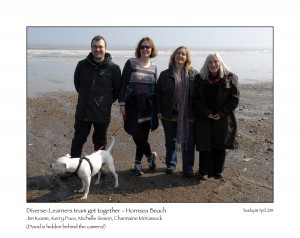We really do know how you feel…
At Diverse Learners, we really do know how you feel…
The team have experienced:Dyslexia, Dyspraxia, ADD, ASD and/or mental health issues personally and within their immediate family, this ensures an empathetic approach. We try and do things differently – this is a picture of us on Hornsea beach (Jim, Kerry – with the dog, MICHELLE and Dave behind the camera) having a walking meeting with Charmaine McKissock.
Jim has posted about his experiences of dyslexia and I vlog and tweet about dyspraxia now this is Michelle’s personal experience of managing her mental health.
I have often suffered from depression during my adult life, and have in the past needed to take periods off work when I was unable to cope with a stressful profession and workload (I was a midwife back then). I was shocked though, last year, when I seemed to ‘lose myself’. I didn’t recognise my behaviours and honestly felt quite scared that I was losing my mind. I didn’t feel depressed as such, but I could no longer concentrate for more than a few minutes, I couldn’t find the right words when I was speaking, and I kept losing my train of thought. I slept deeper and for longer periods than I have ever done in my life, but still needed more sleep. In fact on several occasions I went back to bed and slept once more for several hours, and then slept again during the night. I was both physically and mentally exhausted.
Looking back on this now, I realise that I had suffered a nervous (or mental) breakdown.
Needing to carry on for other people was a huge motivator for me – we have 3 boys under the age of 7, including 2 year old twins – though I have to admit that I didn’t see it as a motivator at the time. It was very hard to get things done, and often, to be honest I just couldn’t do more than what was absolutely necessary for the boys whilst my partner was at work. It was taking every ounce of energy that I’d got to exist. I didn’t want to talk to anyone, including my friends, and members of my family. I would see who was calling on the phone, and just decide not to answer it as I couldn’t bear to make the effort of chatting and pretending that everything was OK. Having said that – support from my family has been crucial to my (ongoing) recovery, even though I was quick to argue if I thought that the wrong thing had been said to me. My older adult children and my parents would genuinely ask how I was, and send supportive text messages, but I was somehow embarrassed by them knowing I was ill. I was emotionally sensitive and very easily irritated. I was also more sensitive to noise, which is not an easy thing to live with, in a house full of small children.
I read lots of information about anxiety and depression, and circumstances similar to mine in my previous employment. This seemed to validate how ill I was feeling, and made me recognise that I was not alone. I visited my GP and used prescribed medication to help me physically, and I still am, although I have managed to reduce the dosage over the year. Of course I regularly had to fight with the thought that my GP would think I was making it all up. Oh dear, we really are our own worst enemy sometimes.
Time is a healer, but I needed counselling to help me get through this awful period. As a consequence of particular difficulties, I felt that I had no choice but to leave my full time and relatively well paid job, together with the prestige that I personally felt went hand in hand with it. This was a huge decision for me, and one that was not taken lightly. However, I began to appreciate that the stress in that particular job was impacting on my physical and mental health, and I needed to look after myself more than I needed to earn the money.
I very gradually began to take out small periods of time for myself, going for a short walk in the fresh air, visiting the local coffee shop, reading trashy novels, looking at ‘nothing in particular’ on the internet, etc. I looked into mindfulness and meditation to try to learn to switch off.
I actually really enjoy doing this, but I need to make a point of continuing to find time to myself to benefit more from it. As I write this I see that I should perhaps treat this as a priority!
I tried to think of positive things. At the beginning of 2013 I read about using a jar to collect just one positive thought from each day, with the intention of reading them back at the end of the year, but I found that so difficult that I abandoned it mid-February. I honestly couldn’t think of anything positive to put in there. A year or so later, it’s been therapeutic to write this blog, and I know I could have gone on and on. In the past I have written my thoughts down and somehow that has made me feel better. So without the pressure of trying to find something positive, there is a benefit from getting your thoughts down – writing them or recording them.
Mental health (and ill health) is quite a big topic at the moment, but it is something that is difficult to understand unless you have been there. Even when you’re in the midst of a mental illness, it is difficult for you to understand yourself too. It makes even the simplest thing such an arduous task.
This is a long road, and one that I anticipate will end somewhere around the deep bend in the distance. I know I will get better, but I’m not there yet. I need to continue to look after myself. It’s not about being selfish but if I don’t do that, how can I expect to support others around me.
Michelle is a study skills tutor and mentor at Diverse Learners to read her profile click here


5 Comments to “ We really do know how you feel… ”